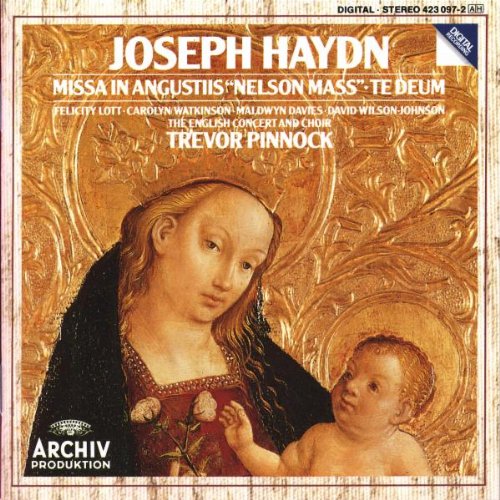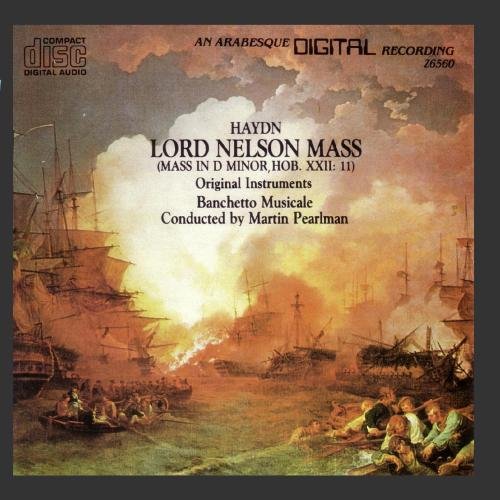Haydn Nelson Mass
View record and artist detailsRecord and Artist Details
Composer or Director: Joseph Haydn
Genre:
Vocal
Label: Archiv Produktion
Magazine Review Date: 2/1988
Media Format: CD or Download
Media Runtime: 50
Mastering:
DDD
Catalogue Number: 423 097-2AH

Tracks:
| Composition | Artist Credit |
|---|---|
| Mass No. 11, 'Missa in angustiis', 'Nelsonmesse' |
Joseph Haydn, Composer
(The) English Concert (The) English Concert Choir Carolyn Watkinson, Contralto (Female alto) David Wilson-Johnson, Baritone Felicity Lott, Soprano Joseph Haydn, Composer Maldwyn Davies, Tenor Trevor Pinnock, Conductor |
| Te Deum for the Empress Marie Therese |
Joseph Haydn, Composer
(The) English Concert (The) English Concert Choir Joseph Haydn, Composer Trevor Pinnock, Conductor |
Composer or Director: Joseph Haydn
Label: Arabesque
Magazine Review Date: 2/1988
Media Format: CD or Download
Media Runtime: 39
Mastering:
DDD
Catalogue Number: Z6560

Tracks:
| Composition | Artist Credit |
|---|---|
| Mass No. 11, 'Missa in angustiis', 'Nelsonmesse' |
Joseph Haydn, Composer
Banchetto Musicale Chorus Banchetto Musicale Orchestra James Maddalena, Baritone Jeffrey Thomas, Tenor Joseph Haydn, Composer Martin Pearlman, Harpsichord Pamela Dellal, Mezzo soprano Sharon Baker, Soprano |
Author: hfinch
Both these recordings provide stimulating perspectives on the work: Pinnock's, by far the more successful, actually supersedes both Argo versions from Hickox and Willcocks in insight, performing skill and recording quality. Presentation alone is superior: Archiv offer the fullest notes and text include the Te Deum as well on the single disc, and take the trouble to sing in German, not Italian Latin.
It is, without doubt, the distinctive sonority which sets this performance apart: the trumpets and drums bite into the dissonance of the Kyrie and the Benedictus; there is finely pointed, near vibrato-less string playing, mordant and urgent; there is the heavy groan of the bass strings on the repeated notes of the ''Qui tollis''. But it is also Pinnock's tempos which bring the score into sharp focus. The
In this, as elsewhere, it helps not a little to have a choir of young professionals. The English Concert Choir may be a little chill compared with the full-blooded singing of Hickox's London Symphony Chorus, but the balance with the instrumental forces is meticulous, the matching of inflexion minutely observed.
Pinnock's soloists have been chosen to blend and highlight the tone values of his distinctive palette. They are no specialist early music-makers but each one has a highly intelligent grasp of phrasing and pacing: David Wilson-Johnson's ''Qui tollissi combines both true bass weight and the momentum of long-breathed, elegantly tapering phrases, while Felicity Lott hones away every trace of superfluous vibrato for her lithe, plangent Benedictus. No other team of soloists is so well-matched; though the considerable and abiding attraction of the otherwise conservative, even precious, Willcocks performance is the presence of Sylvia Stahlman's soprano and Tom Krause's bass.
The second new version, that by Pearlman and the Boston-based Banchetto Musicale, is disappointing. The forces (not listed or described) sound smaller even than Pinnock's too small for the texture and scale of the work, as they provide insufficient ballast for lively, eager, but essentially unstylish choral singing. There is a serious lack of balance here, too: the choir's tenors dominate and the soloists sound as if they are singing from within a glass jar. Individual performances are high on zeal and low on discipline, with a sizeable vibrato in James Maddalena's baritone providing yet another distraction in a well-meaning but ill-at-ease performance.'
Discover the world's largest classical music catalogue with Presto Music.

Gramophone Digital Club
- Digital Edition
- Digital Archive
- Reviews Database
- Full website access
From £8.75 / month
Subscribe
Gramophone Full Club
- Print Edition
- Digital Edition
- Digital Archive
- Reviews Database
- Full website access
From £11.00 / month
Subscribe
If you are a library, university or other organisation that would be interested in an institutional subscription to Gramophone please click here for further information.




